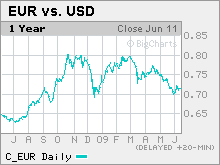Dollar rallies on G8 comments
The greenback gets a boost after Russia's finance minister confirms the dollar's dominant position as world's main reserve currency.
NEW YORK (Reuters) -- The dollar gained broadly Monday as Russia expressed confidence in the greenback as the world's reserve currency, while concerns about the euro zone economy undermined the euro.
Russia's remarks outweighed data showing a slump in New York state's factory sector in June and a net capital outflow from the United States in April.
"We saw a lot of dollar-supportive comments from the G8 finance ministers' meeting, starting with Kudrin," said Sebastien Galy, currency strategist at BNP Paribas in New York.
Speaking on the sidelines of a Group of Eight finance ministers in Italy, Russia's Alexei Kudrin said the dollar's role as the world's main reserve currency is unlikely to change in the near future.
This boosted the dollar, alleviating concerns that major emerging market countries may be diversifying their reserves away from the dollar ahead of a summit of leaders of Brazil, Russia, India and China (BRIC) in Russia Tuesday.
The International Monetary Fund Monday also threw its support behind the U.S. unit, saying the dollar's status as the world's dominant reserve currency is likely to remain.
"Some people have sold the dollar as a result of chatter about diversification away from the U.S. dollar. Now that the finance ministers are standing by the dollar, people are starting to buy the dollar again," UBS currency strategist Brian Kim said.
In midday New York trading, the ICE Futures' dollar index, a gauge of the greenback's value against a basket of major currencies, rose 1.4% to 81.244
The euro fell to $1.3774 against the dollar on electronic trading platform EBS, the lowest in more than three weeks, as investors worried about persistent weakness in the euro zone. The euro last traded at $1.3788, down 1.7%.
The single euro area currency also fell sharply against the yen to ¥134.93, a roughly two-week low. It was last at ¥135.01, down nearly 2% from late on Friday.
A German industry group warned on Monday that tight credit conditions are putting a squeeze on German firms, which may hamper a recovery.
Investors also fretted about news suggesting euro zone banks could face another $283 billion in writedowns.
The ECB estimated bank writedowns from securities -- or toxic assets -- would total around $218 billion from the start of the financial turmoil to the end of 2010, while bad loans would account for another $431 billion -- a total of $649 billion, with an estimated $366 billion already announced.
The figures were published in the ECB's latest Financial Stability Review.
Meanwhile, U.S. data on Monday showing New York's factory sector shrinking at a more severe rate in June hardly moved market sentiment. One analyst even said the New York Federal Reserve's "Empire State" report, which was weaker than expected, suggested broad stability relative to the May figure.
"All in all, the data will probably be seen as a sign that May Empire improvement was an exaggeration and the latest numbers are still consistent with further improvements in other indices including the ISM (Institute for Supply Management)," said Alan Ruskin, chief international strategist, at RBS Global Banking and Markets in Greenwich, Connecticut.
Markets also reacted little to a U.S. Treasury report showing a capital outflow in April, with China, Russia, and Japan all reducing their holdings of U.S. Treasurys. ![]()


